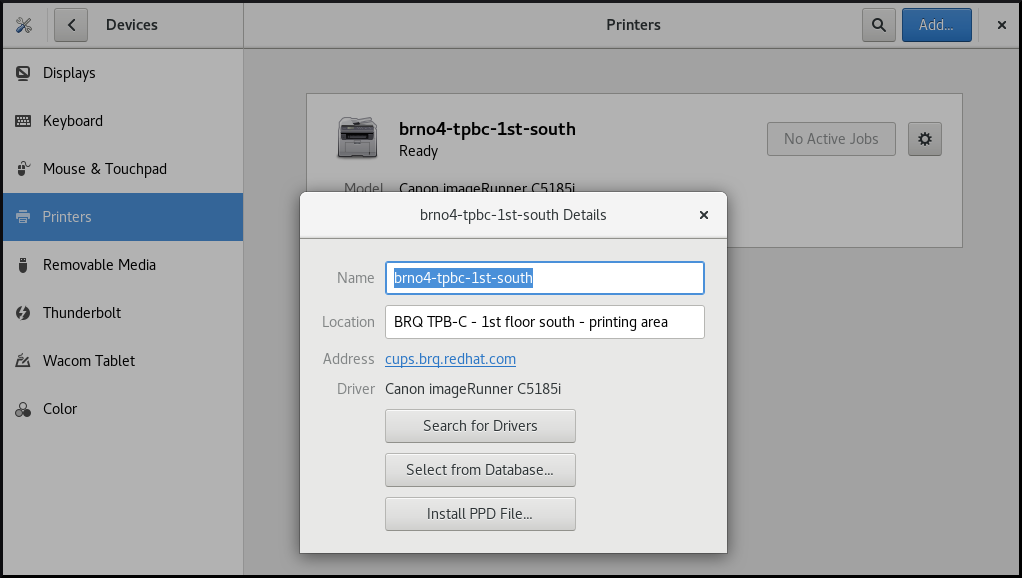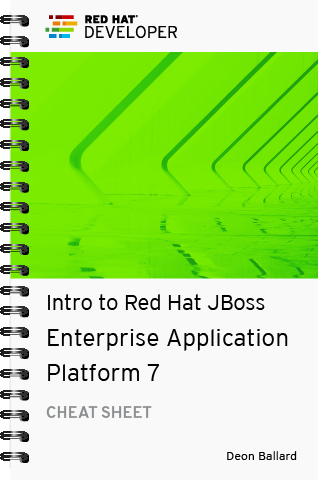
The source for the Windows drivers is hosted in a repository on GIT hub. Anonymous users can clone the repository
OS Type Version Release Date Lang File; Windows 10 32-bit Windows 10 64-bit Windows 7 32-bit Windows 7 64-bit Windows 8.1 32-bit Windows 8.1 64-bit: Driver.
git clone git://github.com/virtio-win/kvm-guest-drivers-windows.git
Binary Drivers
Create the interfaces to be bonded as per Example 11.2, “Example ifcfg-ethX bonded interface configuration file” and assign them to the bond interfaces as required using the MASTER=bondN directive. Online store for products and services. The Enterprisers Project. Articles written by CIOs, for CIOs. Red Hat Marketplace. A place to try, buy, sell, and manage certified enterprise software for container-based environments. Want to find out wifi or Ethernet driver name on a CentOS 7 or RedHat Enterprise Linux 7? Try: lspci -s 04:00.0-v Sample outputs: 04. The driver installation updates odbcinst.ini. Odbcinst.ini contains the list of drivers that are registered with the unixODBC Driver Manager. To discover the location of odbcinst.ini on your computer, execute the following command: odbcconfig -odbcinstini.
Binary drivers are provided by some Linux distributions including WHQL Certified drivers.
For example the binary drivers for Ubuntu can be found here.
64-bit versions of Windows Vista and newer (this currently includes Windows Server 2008, Windows 7, Windows 8, Windows Server 2008 R2 and Windows Server 2012) require the drivers to be digitally signed to load.
If your distribution does not provide binary drivers for Windows, you can use the package from the Fedora Project. These drivers are digitally signed, and will work on 64-bit versions of Windows:
- Drivers should be signed for Windows 64bit platforms.
- Here are some links how to self sign and install self signed drivers:
This article explains how to install the Microsoft ODBC Driver for SQL Server on Linux. It also includes instructions for the optional command-line tools for SQL Server (bcp and sqlcmd) and the unixODBC development headers.
This article provides commands for installing the ODBC driver from the bash shell. If you want to download the packages directly, see Download ODBC Driver for SQL Server.

Microsoft ODBC 17
The following sections explain how to install the Microsoft ODBC driver 17 from the bash shell for different Linux distributions.
Important
If you installed the v17 msodbcsql package that was briefly available, you should remove it before installing the msodbcsql17 package. This will avoid conflicts. The msodbcsql17 package can be installed side by side with the msodbcsql v13 package.
Alpine Linux
Note
Driver version 17.5 or higher is required for Alpine support.
Debian
Note
You can substitute setting the environment variable 'ACCEPT_EULA' with setting the debconf variable 'msodbcsql/ACCEPT_EULA' instead: echo msodbcsql17 msodbcsql/ACCEPT_EULA boolean true | sudo debconf-set-selections
Red Hat Enterprise Server and Oracle Linux
SUSE Linux Enterprise Server
Ubuntu
Note
- Driver version 17.2 or higher is required for Ubuntu 18.04 support.
- Driver version 17.3 or higher is required for Ubuntu 18.10 support.
Note
You can substitute setting the environment variable 'ACCEPT_EULA' with setting the debconf variable 'msodbcsql/ACCEPT_EULA' instead: echo msodbcsql17 msodbcsql/ACCEPT_EULA boolean true | sudo debconf-set-selections
Previous versions
The following sections provide instructions for installing previous versions of the Microsoft ODBC driver on Linux. The following driver versions are covered:
ODBC 13.1
The following sections explain how to install the Microsoft ODBC driver 13.1 from the bash shell for different Linux distributions.
Debian 8
RedHat Enterprise Server 6
RedHat Enterprise Server 7
SUSE Linux Enterprise Server 11
SUSE Linux Enterprise Server 12
Ubuntu 15.10
Ubuntu 16.04
Ubuntu 16.10
ODBC 13
The following sections explain how to install the Microsoft ODBC driver 13 from the bash shell for different Linux distributions.
RedHat Enterprise Server 6
RedHat Enterprise Server 7
Ubuntu 15.10
Ubuntu 16.04
SUSE Linux Enterprise Server 12
Offline installation
If you prefer/require the Microsoft ODBC Driver 13 to be installed on a computer with no internet connection, you will need to resolve package dependencies manually. The Microsoft ODBC Driver 13 has the following direct dependencies:
Redhat Install Nvidia Drivers
- Ubuntu: libc6 (>= 2.21), libstdc++6 (>= 4.9), libkrb5-3, libcurl3, openssl, debconf (>= 0.5), unixodbc (>= 2.3.1-1)
- Red Hat:
glibc, e2fsprogs, krb5-libs, openssl, unixODBC - SUSE:
glibc, libuuid1, krb5, openssl, unixODBC
Red Hat Drivers
Each of these packages in turn has their own dependencies, which may or may not be present on the system. For a general solution to this issue, refer to your distribution's package manager documentation: Redhat, Ubuntu, and SUSE
It is also common to manually download all the dependent packages and place them together on the installation computer, then manually install each package in turn, finishing with the Microsoft ODBC Driver 13 package.
Redhat Linux Enterprise Server 7
- Download the latest
msodbcsql.rpmfrom https://packages.microsoft.com/rhel/7/prod/. - Install dependencies and the driver.
Ubuntu 16.04
- Download the latest
msodbcsql.debfrom https://packages.microsoft.com/ubuntu/16.04/prod/pool/main/m/msodbcsql/. - Install dependencies and the driver.
SUSE Linux Enterprise Server 12

- Download the latest
msodbcsql.rpmfrom https://packages.microsoft.com/sles/12/prod/. - Install the dependencies and the driver.
After you have completed the package installation, you can verify that the Microsoft ODBC Driver 13 can find all its dependencies by running ldd and inspecting its output for missing libraries:
ODBC 11
The following sections explain how to install the Microsoft ODBC driver 11 on Linux. Before you can use the driver, install the unixODBC driver manager. For more information, see Installing the Driver Manager.
Installation Steps
Important
These instructions refer to msodbcsql-11.0.2270.0.tar.gz, which is installation file for Red Hat Linux. If you are installing the Preview for SUSE Linux, the file name is msodbcsql-11.0.2260.0.tar.gz.
To install the driver:
Make sure that you have root permission.
Change to the directory where the download placed the file
msodbcsql-11.0.2270.0.tar.gz. Make sure that you have the *.tar.gz file that matches your version of Linux. To extract the files, execute the following command,tar xvzf msodbcsql-11.0.2270.0.tar.gz.Change to the
msodbcsql-11.0.2270.0directory and there you should see a file called install.sh.To see a list of the available installation options, execute the following command: ./install.sh.
Make a backup of odbcinst.ini. The driver installation updates odbcinst.ini. odbcinst.ini contains the list of drivers that are registered with the unixODBC Driver Manager. To discover the location of odbcinst.ini on your computer, execute the following command:
odbc_config --odbcinstini.Before you install the driver, execute the following command:
./install.sh verify. The output of./install.sh verifyreports if your computer has the required software to support the ODBC driver on Linux.When you are ready to install the ODBC driver on Linux, execute the command:
./install.sh install. If you need to specify an install command (bin-dirorlib-dir), specify the command after the install option.After reviewing the license agreement, type YES to continue with the installation.
Installation puts the driver in /opt/microsoft/msodbcsql/11.0.2270.0. The driver and its support files must be in /opt/microsoft/msodbcsql/11.0.2270.0.
To verify that the Microsoft ODBC driver on Linux was registered successfully, execute the following command: odbcinst -q -d -n 'ODBC Driver 11 for SQL Server'.
Uninstall
You can uninstall the ODBC driver 11 on Linux by executing the following commands:
rm -f /usr/bin/sqlcmdrm -f /usr/bin/bcprm -rf /opt/microsoft/msodbcsqlodbcinst -u -d -n 'ODBC Driver 11 for SQL Server'
Driver files
The ODBC driver on Linux consists of the following components:
| Component | Description |
|---|---|
| libmsodbcsql-17.X.so.X.X or libmsodbcsql-13.X.so.X.X | The shared object (so) dynamic library file that contains all of the driver's functionality. This file is installed in /opt/microsoft/msodbcsql17/lib64/ for the Driver 17 and in /opt/microsoft/msodbcsql/lib64/ for Driver 13. |
msodbcsqlr17.rll or msodbcsqlr13.rll | The accompanying resource file for the driver library. This file is installed in [driver .so directory]./share/resources/en_US/ |
| msodbcsql.h | The header file that contains all of the new definitions needed to use the driver. Note: You cannot reference msodbcsql.h and odbcss.h in the same program. msodbcsql.h is installed in /opt/microsoft/msodbcsql17/include/ for Driver 17 and in /opt/microsoft/msodbcsql/include/ for Driver 13. |
| LICENSE.txt | The text file that contains the terms of the End-User License Agreement. This file is placed in /usr/share/doc/msodbcsql17/ for Driver 17 and in /usr/share/doc/msodbcsql/ for Driver 13. |
| RELEASE_NOTES | The text file that contains release notes. This file is placed in /usr/share/doc/msodbcsql17/ for Driver 17 and in /usr/share/doc/msodbcsql/ for Driver 13. |
Red Hat Driver Update Program
Resource file loading
The driver needs to load the resource file in order to function. This file is called msodbcsqlr17.rll or msodbcsqlr13.rll depending on the driver version. The location of the .rll file is relative to the location of the driver itself (so or dylib), as noted in the table above. As of version 17.1 the driver will also attempt to load the .rll from the default directory if loading from the relative path fails. The default resource file path on Linux is /opt/microsoft/msodbcsql17/share/resources/en_US/.
Red Hat Driver Update Disk
Troubleshooting
If you are unable to make a connection to SQL Server using the ODBC driver, see the known issues article on troubleshooting connection problems.
Next steps
After installing the driver, you can try the C++ ODBC example application. For more information about developing ODBC applications, see Developing Applications.
For more information, see the ODBC driver release notes and system requirements.

